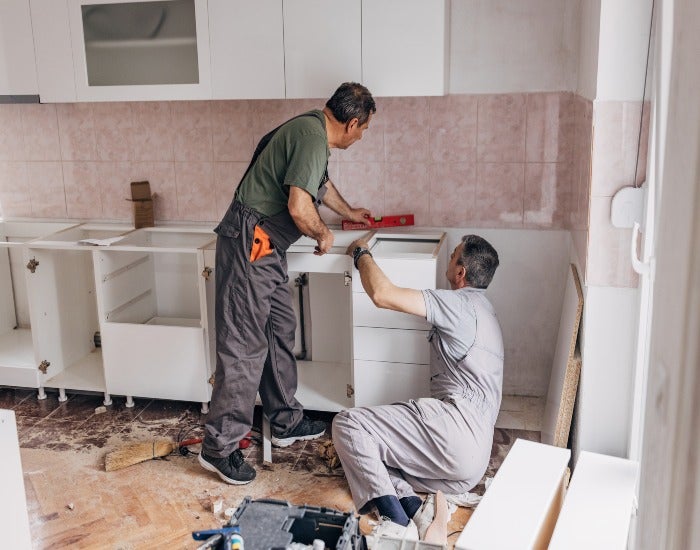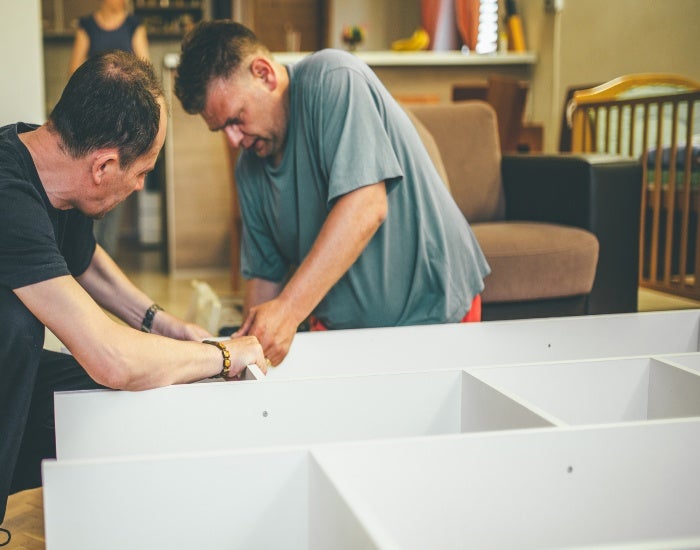How to Finish a DIY Wood Countertop
The Countertop Company offers a wide range of countertop solutions to meet all your kitchen needs. But for those looking for an affordable, DIY-friendly option, wood countertops are the way to go. When finished correctly, you’ll have a beautiful and unique wooden surface that adds warmth and style to your space. Let’s explore how to finish your DIY wood countertop in four easy steps.

What Is a DIY Wood Countertop?
Create your own custom countertop with a DIY wood top from The Countertop Company. With pre-cut cutouts and faucet holes, all you need to do is finish sanding, sealing and installation for the perfect handmade addition in your home. Save money but get that luxe look you crave!
The Process
When it comes to DIY wood countertops, we offer our customers solutions. After choosing your DIY wood top from The Countertop Company, it’s time to start the finishing process. This is essential to ensure a quality finish that will look great for years to come. The process includes the following important steps:
Step 1: Sanding
The first step to finishing your wood countertop is sanding. Sanding will smooth out any rough edges or imperfections on the surface of the wood and give it a nice finish. Start with a coarse grit paper (roughly 80-100) and work your way up to finer grits (150-220). Make sure to use even strokes when sanding so that you don’t damage the surface of the wood. While sanding, make sure to wear protective gear like gloves and goggles as sanding can be hazardous if done incorrectly.
Step 2: Sealing
Once you’ve finished sanding, it’s time to seal your countertop. This is essential for protecting the wood from moisture damage and spills over time. Your sealant should be oil-based with acrylic polyurethane to protect against water damage and stains. Applying sealant may require multiple coats depending on how much protection you want for your countertop, so make sure that each coat has had enough time to dry before applying another one.
Advantages of DIY Wood Countertops
The major advantage of DIY wood countertops is that they can be customized to perfectly fit into the size, shape, and style of your space while still providing a long-lasting surface. The top layer can also be finished with a variety of different sealing methods to enhance their beauty, water-resistance, and durability. The wide range of wood-making options include veneers, which can be created using classic hardwoods like maple or cherry or more exotic reclaimed woods. The versatility of these countertops makes them perfect for any kitchen or bathroom application–from small home bars to larger-scale commercial projects!

DIY wooden countertops are relatively cheap compared to other types of materials such as granite or quartz and they’re easy enough for anyone with basic carpentry skills to install themselves. They also have noise dampening properties which is great if you live in a noisy area. Wood countertops are also easily repaired should anything go wrong during the installation or use over time.
Disadvantages of DIY Wood Countertops
The Countertop Company in California recognizes the advantages of doing a DIY countertop-installation in their homes, but they also caution of the disadvantages. The biggest downfall of a DIY installation is the time it takes to complete the task. It often requires several days of precision sanding and fitting, and those without experience may not be able to finish in an effective manner. Additionally, there can be costly mistakes and project waste if proper measurements are not taken when buying supplies, or if the wood itself is not fit for use. The Countertop Company encourages homeowners who choose DIY projects to communicate with knowledgeable professionals for advice on how to reach a satisfactory result.
Also, take note that if you choose to install a wood countertop that wood is flammable so it’s important not to leave anything hot on the surface as it could cause serious damage or even start a fire! Wooden surfaces also need more maintenance than other materials since they can warp over time due to changes in temperature or humidity levels in the room where they are installed. Lastly, since wooden surfaces are porous, they can absorb liquids which can stain them over time if not sealed properly beforehand.
Installing a DIY wood countertop can be an affordable way to add style and charm into your home without breaking the bank! If done correctly with proper care and maintenance, it can last you years but remember that there are some downsides too such as flammability and higher maintenance costs over time compared with other materials so always do research before deciding on what type of material works best for you!
If you would like help understanding your requirements better contact The Countertop Company now! We would love to help guide you towards making the best decision possible when it comes to choosing the perfect countertop solution for your home!
““
